- Home
- Stephen E. Ambrose
Supreme Commander Page 8
Supreme Commander Read online
Page 8
One reason Eisenhower ran an efficient office was that he knew how a staff should function. He once said that he suspected he had been a chief of staff, either to a division, corps, or army, longer than anyone else in the U. S. Army, so he knew how to run an organization. He emphasized the positive. When he was dissatisfied with or disappointed in an officer, he seldom wasted time criticizing him, but instead sent him back to the States. He preferred to praise and encourage, to give a man a task and then leave him alone, resisting the temptation to look over his shoulder or to guide him to the correct solution. When the work was well done, he saw to it that the man got credit for his accomplishment.
Support from Marshall helped too. Eisenhower was not particularly good at bringing forth hidden talent; instead he gave up on officers who disappointed him and asked Marshall for a proven replacement. After August, when it was clear that Eisenhower was the permanent theater commander and Marshall was going to stay in Washington, Marshall gave Eisenhower the men he wanted.
Eisenhower had spent much of his time in the twenties coaching football teams and he adopted most of the ideas about morale that football coaches had developed through the years. He wanted the emphasis on the team rather than upon the star, co-ordination of effort rather than flashy individual performances. He said that one of the reasons he wanted to move his headquarters out of London was to get the staff living “together like a football team” so that the officers could “think war, plan war, and execute war twenty-four hours a day, or at least all of our waking hours.”4 On a great football team everyone’s responsibility intertwined and all pulled together. Success came through team effort. Eisenhower wanted his headquarters to operate on the same basis.
“War has become so comprehensive and so complicated that teamwork seems to me to be the essence of all success,” Eisenhower once declared. “Each bureau, each section, each office … has to be part of a well-coordinated team.” Because he thought that “no successful staff can have any personal enmities existing in it,” he insisted “on having a happy family.… I want to see a big crowd of friends around here.” This had been important to Eisenhower since the twenties, when Fox Conner told him that a commander should never have a personal enemy on his staff, since he would sabotage the commander.5
In the summer of 1942 Eisenhower could go only so far in shaping his staff, since practically none of the officers was hand-picked. At the end of July he was still growling about the inability of the staff to function. He wondered if his own drive was causing his officers to leave all decisions and initiative to him, a tendency he regarded as near disastrous. “Too many staff officers are merely pushing paper,” Eisenhower declared, “and we can’t win this war pushing paper. It takes imagination and initiative and a lot of it.”6 He did simplify his task, and that of his headquarters staff, by divesting himself of most administrative responsibilities, turning them over to the head of the Services of Supply (SOS) organization in England, Major General John C. H. Lee, a martinet who was both willing and able to handle the thousands of details connected with the presence of the American Army in England. Lee freed Eisenhower and his staff for more important work.7
Eisenhower forcibly impressed his presence upon his staff, but with the British and even with the U. S. War Department his position still seemed temporary. BOLERO was not making great strides and Eisenhower did not have a large command. European Theater of Operations, United States Army (ETOUSA), consisted of a total of 55,390 officers and men. Headquarters at 20 Grosvenor had 105 ground officers, 20 air officers, 18 attached officers, and 12 enlisted men. The U. S. Eighth Air Force had 918 officers and 10,047 enlisted men, while there were 37,226 ground force enlisted men in ETO (which contained the British Isles and Iceland).
Common talk around the War Department reflected the general opinion that Eisenhower’s appointment was an interim one, an opinion which he shared but which he was beginning to resent. In late July, when he received a chatty letter from Lieutenant General Brehon Somervell, head of SOS in Washington, he came close to admitting his feelings of uncertainty. After telling Somervell that he could not imagine how much his letter had meant, Eisenhower added, “It is so easy to lose contact with the War Department that frequently I am overcome by a ‘lost’ feeling, and have a desperate desire to jump on a fast plane and come over for a twenty-four-hour visit.”8 The basic trouble was that no one really knew how important the job in London was going to be. If BOLERO went forward and was followed by ROUNDUP, it would be the biggest command in the war, but the British were dragging their heels and ROUNDUP was by no means certain. Marshall was not going to step down as Chief of Staff for a minor post, and he certainly could not retain his position as head of the American Army while serving in London as theater commander. On the other hand, even if BOLERO-ROUNDUP did go forward, Marshall could not appoint himself to the command—only Roosevelt could, and Roosevelt had not revealed whether or not he was willing to give up Marshall’s services as Chief of Staff. The result was that everyone had to mark time until final decisions were reached, which was irritating—especially to Eisenhower—but unavoidable.
There was nothing Eisenhower could do about the ambiguous situation, but he could and did make sure that until a change was made the War Department looked upon him as the Commanding General, ETO. Just two days after his arrival in London he told Somervell to “straighten out for me” certain aspects of the assignment of personnel to his theater. The War Department had been sending officers to ETO with an assignment to a specific branch, and Eisenhower had just discovered that the department had transferred a man from SOS to the Eighth Air Force. Although Somervell was his superior in rank and experience, Eisenhower informed him that “such a move involves only the authority of the theater commander,” and told him in the future to see to it that such assignments were made only to the theater commander. He concluded by admitting that this was a minor matter, “but I am simply trying to keep the strings all tied together so that no loose ends are flopping around.”9
Eisenhower was insistent that his authority and the position of his headquarters be recognized by all Americans in the United Kingdom. In July, when he learned that an American civilian agency in London had suggested that the British take over the rationing of food for U.S. troops, Eisenhower told Somervell that “this suggestion strikes me as just another sample of the things that plague a commander in a world capital, where there are all kinds and descriptions of U.S. governmental representatives. These people form contacts with a complete maze of local civil agencies that seem to have little coordination before the Prime Minister.” Time and again, Eisenhower said, he got news of propositions being discussed between British and U.S. civil officials “which impinge directly upon the responsibilities of this Headquarters.” The reason, he thought, was that the headquarters had been just a mission before his arrival, “just another of the many agencies that dealt with important matters in a very uncoordinated and haphazard manner.” The civil agencies had as a result gotten into the habit of proposing to the British “far-reaching plans and schemes without taking the trouble to see that this headquarters approves.” Eisenhower promised to overcome the problem, “or else.”10
Establishing ETO’s importance was not easy. Two days after his complaint to Somervell, Eisenhower learned that Ambassador Winant wanted to create a Bomber Objective Committee at the embassy, and that he had developed the plan with the aid of members of Eisenhower’s staff without Eisenhower’s knowledge. Eisenhower patiently explained to Winant that the committee idea would not work at all, but it took time and gave emphasis to his statement to Handy: “It is not an exaggeration to say that, right this minute, I could profitably place fifteen additional top-notch officers if I had them.”11
Eisenhower was satisfied with his naval aide. His closest associate in London was Navy Reserve Captain Harry Butcher, a Columbia Broadcasting System vice-president who was a family friend of the Eisenhowers. Just before leaving Washington Eisenhower had requested Butcher’
s services as “naval aide,” and Admiral King had acceded to the unique request. Eisenhower wanted Butcher around because he was a good bridge player, pleasant company, and knew something of public relations. He asked “Butch” to keep a diary, which Butcher did throughout the war. Eisenhower told a friend once, “Sometimes I get back to quarters and I just want to curl up in a corner like a sick dog. Butch won’t let me.” He went on, “Butcher’s job is simple. It is to keep me from going crazy.”12
One of Butcher’s first jobs was to find a weekend retreat. He selected Telegraph Cottage, a tiny, quaint house twenty-five minutes from London. It fit Eisenhower’s needs perfectly. The slate-roofed cottage was off the beaten track, nestled in a ten-acre wooded tract near Richmond Park. It had a private road leading into it, a high wooden fence, and a small rose garden. The living room had ceiling-to-floor windows opening out onto the lawn, a fireplace for heat, and an old oak table. Butcher got it for thirty-two dollars a week, complete with the services of a gardener. The grounds fringed on a golf course and Eisenhower frequently stepped out and played the adjacent holes. At other times he and Butcher would engage in .22 pistol practice shooting in back of the cottage, or Sergeant Mickey McKeogh, an aide, would get out a baseball and some gloves and play catch with the general.13
Eisenhower spent as many weekends at Telegraph Cottage as he could, lounging around the living room in G.I. slacks, an old shirt, a half-suede, half-leather jacket, and a shabby pair of straw slippers left over from Manila. He refused to look at newspapers, books, or general magazines. Instead, he devoured paper-backed cowboy magazines, which Sergeant Mickey scrounged up for him. Mrs. Kay Summersby, his driver, thought it disgraceful that one of the most important men in the world read pulp magazine junk, and once told Eisenhower exactly what she thought of his habit. He replied that he came to the cottage to rest, and when he read Westerns, “I don’t have to think.”14
He did not often have that luxury. One of his major immediate tasks was preparing for the Americans who were coming to his theater—eventually 2,000,000. In an island only slightly larger than Colorado these men had to be sheltered, fed, trained, and organized, all in the midst of a local people who were underfed, had already placed even submarginal ground under intense cultivation, and were suffering in nearly every conceivable way. From the moment he first stepped on the island, Eisenhower felt that one of his major tasks was to ensure good relations with the English people, a task for which he had no background. The problem was acute because the American soldier was just as unprepared.
The G.I. came onto the islands viewing himself as a privileged crusader who had come to pull Britain out of a hole, in much the same way as the World War I doughboy who explained that AEF stood for “After England Failed.” The British people saw themselves as the saviors of democracy, the ones who had held the fort while waiting for the Americans to make up their minds, and they were hardly ready to welcome the cocky Americans as their rescuers. Differences in pay scale and the quality and quantity of rations did not help. The American G.I. was the best-paid soldier in the world. In the early stages of the war a majority of those who went overseas were unmarried, so they had no responsibilities back in the States and felt no compunction about blowing their pay as soon as they received it. It bothered the British to see young men throwing so much money around. They could accept the fact that the Americans got more and better food, but even here there was a problem, for American habits of waste led to garbage cans being filled with food that British citizens could have used. As one Englishman put it, the trouble with the Yanks was that they were “overpaid, over-sexed, over-fed, and over here.”
Eisenhower urged his subordinates to conduct “sustained and vigorous campaigns” to induce officers and men to save their pay by buying war bonds, so as to cut down on the “lavish expenditure of money.” He insisted upon eliminating waste and made each commander responsible for the inspection of kitchens and mess halls before and after every meal.
In July the number of Americans in the British Isles was not overwhelming; aside from the 34th Infantry Division in Northern Ireland they were mostly Eighth Air Force personnel. Eisenhower managed to talk with almost all senior commanders, stressing to each one the need for good relations. He ordered the officers to conduct constant educational programs, designed to explain to the G.I. conditions and customs in Britain. Most of all, Eisenhower wanted the G.I. to learn of the sufferings the British had endured since 1939. One of his programs took newly arrived American personnel on a short tour of London’s bombed areas.15
The total Army program, which of course began in the initial training stages in the U.S., was a success. Although for three years hundreds of thousands of young Americans jostled the British public for elbow room, there were few major incidents. By 1945 Anglo-American relations were better than they had been since 1763. Surely those G.I.s who lived side by side, day by day with the English deserved some of the credit.
In a letter he sent to all his senior subordinates, Eisenhower made a number of suggestions beyond the pay, food, and visiting questions to help improve relations. Most important of all, he felt, was good discipline. If the Army had it, it would convince “the British that we are here not as muddling amateurs but as earnest, competent soldiers who know what we are about.” The British had signed agreements with the U. S. Government which gave the Army the right to punish criminals who violated British law. Eisenhower wanted punishment in such cases to be adequate and swift, and he wanted the British authorities notified. But this line of action was only negative; he was more concerned with avoiding serious offenses through the development of good discipline.
Eisenhower recognized that “it is trite indeed” to say that discipline is “a matter of leadership, but evidence of failures along this line are so common in military experience as to warrant the continuous and earnest attention, even of very senior officers.” He believed that there were certain constants by which the state of discipline could be judged: standards of military courtesy, bearing and carriage of soldiers, and neatness in clothing and appearance. He had just visited the 34th Division in Ireland and thought that the infantrymen there made a good appearance. The Air Force and staff officers in London, however, disappointed him. The worst offenders were majors, captains, and lieutenants. On one motor tour of the city, which was filled with newly commissioned Air Force personnel, Eisenhower received just one salute—and that from a British officer. Eisenhower told Major General Carl Spaatz, commanding the Eighth Air Force, that if the young officers did not improve they should be sent home.
All of his professional life Eisenhower had dealt with Regular Army soldiers; now he was being called upon to lead what would soon be the largest civilian army the nation ever put into the field. The G.I.s in it were a cross section of the nation. By European standards, most of them were educated, independently minded men who had been conscripted into the service and who were contemptuous of most of the ways of the old Army. They had certain obvious strengths—their knowledge of motor vehicles, their general mechanical ability, their cocky optimism—and certain obvious weaknesses, chief of which was a tendency to be soft and to grouse, not only at the big things like the bad luck that sent them instead of their neighbor overseas, but at any meal that was not hot. In theory they were supposed to be trained, disciplined, of good morale, and ready to fight when they reached Eisenhower, but in fact he had to assume much of the responsibility for getting them prepared.
Eisenhower thought the first requirement was constant, intensive training. Time was short, the war demanded trained personnel, and “our men must be toughened and hardened physically to stand the most rigorous operations.” Eisenhower felt that the training should be understandable to everyone involved. He recognized that he would never turn the average American soldier into a Prussian-type automaton, that to hope for unquestioned obedience was to hope for too much. Besides, he wanted his soldiers to retain their initiative. He therefore told his subordinates to give constant explan
ations during field exercises, so that the last private in the ranks could “understand the reasons for the exertions he is called upon to make.” Eisenhower declared that “any commander should be summarily relieved who neglects this important phase of training intelligent, patriotic Americans.”
He felt that morale was “the most highly important of any military attribute.” It could never be obtained through pampering the men or lowering the standards of discipline to permit easier living, but rather through self-respect, intensive training, and adequate leadership. He recognized the importance of proper recreational facilities and reasonable pass privileges, but insisted that “they themselves are not the answer to the problem.” Field exercises were his favorite method for achieving high morale, and he visited divisions operating in the field whenever possible. As he told his subordinates, “I cannot overemphasize the concern I feel about all these things … because of my deep conviction that we must form, here, the best army that the United States has ever put into the field.…”16
In the two years preceding the war, Eisenhower had visited a number of divisions engaged in field exercises, and he continued to do so throughout the war. One result, he told a West Point classmate, Brigadier General Vernon E. Prichard, was that he had “developed almost an obsession as to the certainty with which you can judge a division, or any other large unit, merely by knowing its commander intimately.” Eisenhower knew that Prichard had been told that hundreds of times, but confessed that he himself had never realized fully “how infallibly the commander and unit are almost one and the same thing.”
At the time Prichard had not gone high up the rank or command ladder (he later had an armored division in Italy), and partly to buck up his spirits, partly to say some things that he felt deeply, Eisenhower continued: “This is a long tough road we have to travel. The men that can do things are going to be sought out just as surely as the sun rises in the morning. Fake reputations, habits of glib and clever speech, and glittering surface performance are going to be discovered and kicked overboard.” For a man to make it in this war, he had to be a leader with “inexhaustible nervous energy … and iron-clad determination to face discouragement, risk, and increasing work without flinching.…” He would also need imagination—Eisenhower confessed he was “continuously astounded by the utter lack of imaginative thinking among so many of our people that have reputations for being really good officers.” Finally, the man had to be able to forget himself and his personal fortunes.

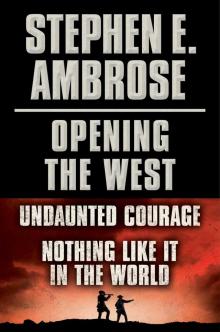 Undaunted Courage
Undaunted Courage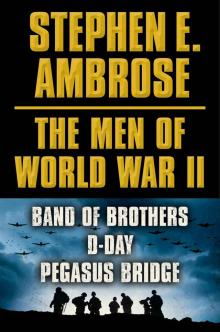 The Victors: Eisenhower and His Boys
The Victors: Eisenhower and His Boys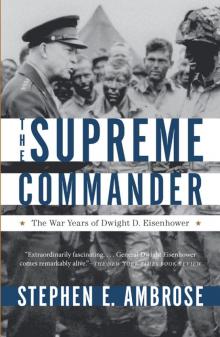 The Supreme Commander
The Supreme Commander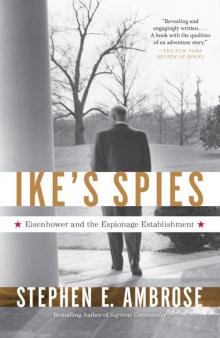 Ike's Spies: Eisenhower and the Espionage Establishment
Ike's Spies: Eisenhower and the Espionage Establishment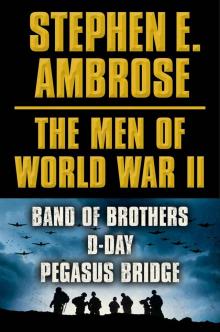 The Men of World War II
The Men of World War II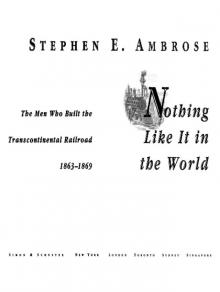 Nothing Like It in the World The Men Who Built the Transcontinental Railroad 1863-1869
Nothing Like It in the World The Men Who Built the Transcontinental Railroad 1863-1869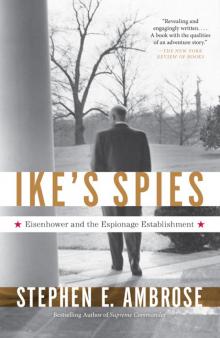 Ike's Spies
Ike's Spies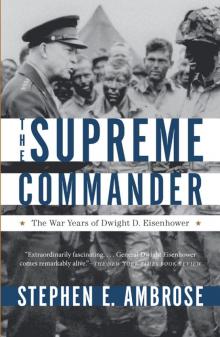 Supreme Commander
Supreme Commander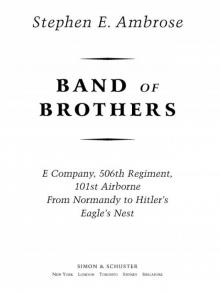 Band of Brothers
Band of Brothers